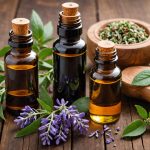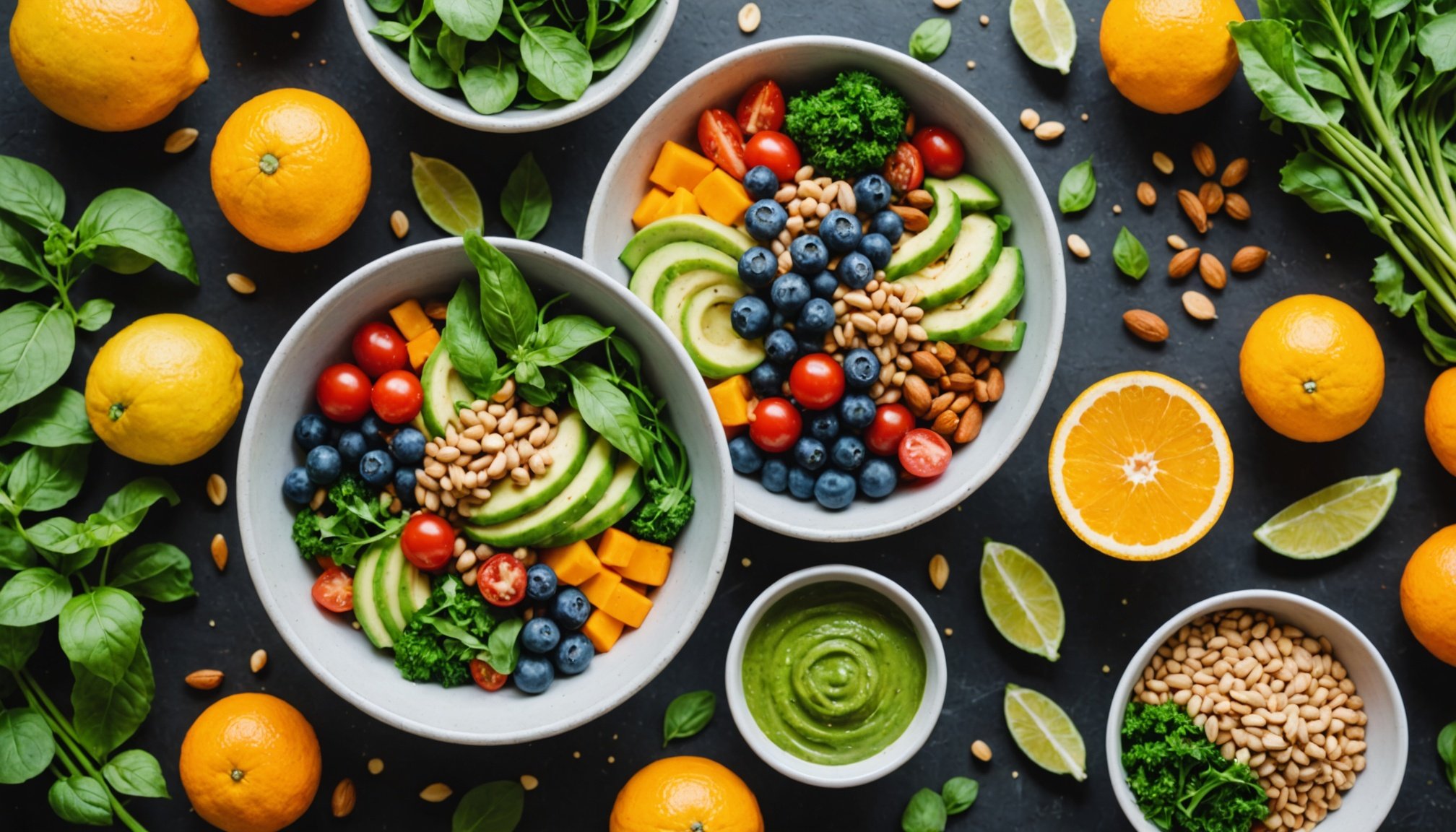Essential Nutrients for Energizing Vegan Diets: Fueling Your Active Lifestyle
Understanding the Basics of a Vegan Diet
When you decide to adopt a vegan lifestyle, it’s crucial to understand that your diet needs to be meticulously planned to ensure you’re getting all the necessary nutrients. A well-balanced vegan diet can be incredibly beneficial for your health and energy levels, but it requires careful attention to certain key nutrients.
“Carefully planned plant-based diets can support healthy living at every age and life stage,” notes the British Dietetic Association.
This might interest you : Top Essential Oils to Fade Scars: Unlocking Nature”s Healing Secrets
Key Nutrients for Vegan Diets
Vitamin B12: The Critical Component
Vitamin B12 is one of the most critical nutrients for vegans to focus on. Since it is found only in animal-sourced foods, vegans must rely on fortified foods or supplements. Vitamin B12 deficiency can lead to fatigue, anemia, and nerve damage, and it also increases the risk of cardiovascular disease.
“The Vegan Society recommends you should either eat fortified foods at least twice a day, aiming for 3mcg of vitamin B12 a day, or take a supplement of at least 10mcg daily or at least 2000mcg weekly,” advises the British Dietetic Association.
Also to discover : Unleashing Timeless Elegance: A Guide to Infusing Vintage Art Deco Style into Your Home Décor
Here are some reliable sources of vitamin B12 for vegans:
- Fortified breakfast cereals
- Yeast extracts
- Soya yoghurts and plant-based dairy alternatives
- Supplements
Vitamin D: Sunlight and Supplements
Vitamin D is essential for maintaining bone health and is produced by your body when your skin is exposed to sunlight. However, during the winter months or for those with limited sun exposure, supplements or fortified foods become necessary.
“Alongside calcium, Vitamin D is important for maintaining bone health. Your body makes this when your skin is exposed to the sun, particularly in the summer months,” explains the British Dietetic Association.
Calcium: Building Strong Bones
Calcium is vital for bone health, and vegans need to ensure they consume enough calcium-rich foods. Low intakes of calcium, combined with low intakes of protein and vitamin D, can adversely affect bone health.
Here are some plant-based sources of calcium:
| Food | Calcium Content (mg per serving) |
|---|---|
| Calcium-set tofu | 200-300 mg per 3 oz serving |
| Fortified plant milk | 300-400 mg per cup |
| Kale | 200 mg per cup cooked |
| Fortified cereals | 100-300 mg per serving |
Iron: Combating Anemia
Iron is crucial for preventing anemia, but the form of iron in plant foods (non-heme iron) is less efficiently absorbed by the body compared to the iron from animal sources (heme iron). However, you can enhance the absorption of iron from plant-based sources by consuming foods rich in vitamin C.
“Plant sources of iron include dried fruits, wholegrains, nuts, green leafy vegetables, seeds, peas, beans, and lentils. Vitamin C helps the iron to be better absorbed,” notes the British Dietetic Association.
Here are some tips to increase iron absorption:
- Eat foods high in vitamin C (like citrus fruits, strawberries, and bell peppers) along with iron-rich foods.
- Cook in cast-iron cookware to increase iron intake.
- Avoid tea and coffee with meals as they can inhibit iron absorption.
Zinc: Supporting Immune Function
Zinc is essential for growth, development, and immune function. Like iron, zinc from plant sources is less efficiently absorbed than from animal sources. Here are some plant-based sources of zinc and tips to enhance absorption:
- Beans, nuts, seeds, wheat germ, and some fortified breakfast cereals.
- Eat fermented soya products like tempeh and miso.
- Soak dried beans and then rinse before cooking.
- Sprout grains and seeds to improve zinc bioavailability.
Omega-3 Fatty Acids: Heart Health and Brain Function
Omega-3 fatty acids, particularly EPA and DHA, are crucial for heart health and brain function. While plant-based sources like flaxseeds, rapeseed oil, and chia seeds provide ALA (alpha-linolenic acid), it is less efficiently converted to EPA and DHA in the body.
“Rapeseed oil, pumpkin seeds, and sunflower seeds are good sources of ALA, but supplements may be necessary to ensure adequate EPA and DHA intake,” suggests the European Food Information Council.
Protein Sources for Muscle Health
Protein is vital for muscle mass and repair, especially for athletes. Here are some high-quality protein sources in a vegan diet:
Legumes and Beans
- Lentils
- Chickpeas
- Black beans
- Kidney beans
Nuts and Seeds
- Almonds
- Chia seeds
- Hemp seeds
- Pumpkin seeds
Meat Substitutes
- Tofu
- Tempeh
- Seitan (from wheat)
- Mycoprotein (sold as Quorn)
Whole Grains
- Quinoa
- Brown rice
- Whole wheat
Here’s a detailed list of protein-rich foods and their protein content:
| Food | Protein Content (grams per serving) |
|---|---|
| Lentils | 18g per 1 cup cooked |
| Chickpeas | 15g per 1 cup cooked |
| Black beans | 15g per 1 cup cooked |
| Tofu | 20g per 3 oz serving |
| Tempeh | 15g per 3 oz serving |
| Seitan | 21g per 3 oz serving |
| Quinoa | 8g per 1 cup cooked |
| Almonds | 6g per 1 oz serving |
Practical Tips for Vegan Athletes
Meal Planning
To ensure you’re getting all the necessary nutrients, meal planning is key. Here are some tips:
- Include a variety of plant-based foods in your diet.
- Eat fortified foods regularly, especially for vitamin B12 and vitamin D.
- Consult with a dietitian or nutritionist to tailor your diet to your specific needs.
Supplements
While whole foods should always be the primary source of nutrients, supplements can fill any gaps. Here are some essential supplements for vegan athletes:
- Vitamin B12 supplements
- Vitamin D supplements (especially during winter months)
- Omega-3 fatty acid supplements (EPA and DHA)
- Iron supplements (if necessary, based on blood tests)
Hydration and Electrolytes
Proper hydration and electrolyte balance are crucial for exercise performance. Here are some tips:
- Drink plenty of water throughout the day.
- Include electrolyte-rich foods like bananas (potassium), avocados (potassium), and nuts (magnesium).
- Use electrolyte supplements or sports drinks during high-intensity training.
Real-Life Examples and Success Stories
Many athletes have successfully adopted vegan diets without compromising their performance. For example, professional athletes like Novak Djokovic and Lewis Hamilton have credited their vegan diets for improved health and energy levels.
“Since going vegan, I’ve noticed a significant improvement in my energy levels and overall health,” says a vegan athlete. “It’s all about planning your meals carefully and ensuring you’re getting all the necessary nutrients.”
A well-planned vegan diet can be incredibly energizing and supportive of an active lifestyle. By focusing on key nutrients like vitamin B12, vitamin D, calcium, iron, zinc, and omega-3 fatty acids, and incorporating a variety of protein-rich foods, you can ensure your body is getting everything it needs to perform at its best.
“Vegan diets can be a viable alternative to traditional diets, offering numerous health benefits and supporting high performance in athletes,” concludes the European Food Information Council.
By following these guidelines and tips, you can fuel your active lifestyle with a balanced and nutritious vegan diet, ensuring you have the energy and health you need to excel in your training and daily life.











